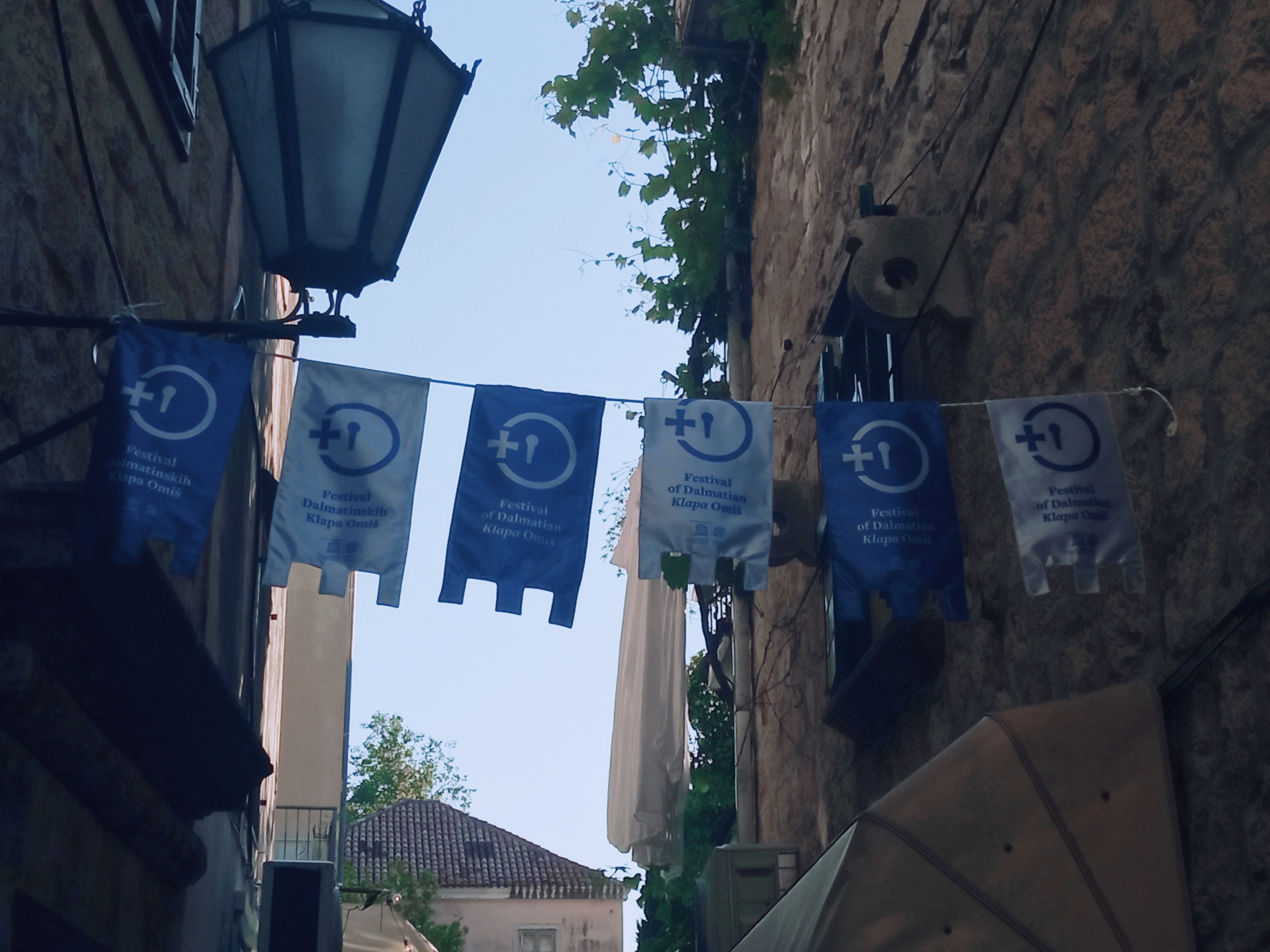|
Klapa
Klapa music is a form of traditional a cappella singing with origins in Dalmatia, Croatia. The word ''klapa'' translates as "a group of friends" and traces its roots to littoral church singing. The motifs in general celebrate love, wine (grapes), country (homeland) and sea. Main elements of the music are harmony and melody, with rhythm very rarely being very important. In 2008, Croatian Ministry of Culture proclaimed it Croatian Intangible Cultural Heritage. In 2012 klapa was inscribed in UNESCO Intangible Cultural Heritage of Humanity. Description A klapa group consists of a first tenor, a second tenor, a baritone, and a bass. It is possible to double all the voices apart from the first tenor. It is usually composed of up to a dozen male singers. In recent times, female vocal groups have been quite popular, but in general male and female groups do not mix. Although klapa is a cappella music, on occasion it is possible to add a gentle guitar and a mandolin (instrument similar ... [...More Info...] [...Related Items...] OR: [Wikipedia] [Google] [Baidu] |
Joško Ćaleta
Joško Ćaleta (2 October 1964) is a Croatian ethnomusicologist, music pedagogue, conductor, composer, record producer and klapa singer.Joško Caleta ''umbc.edu''. University of British Columbia. Access date 24 May 2023.Joško Ćaleta, PhD ''ief.hr''. Institute of Ethnology and Folklore Research. Access date 24 May 2023. He is a member of the Croatian Composers' Society and the Croatian Ethnological Society. Early life and education Born in in 1964, Ćaleta graduated |
Mižerja
Croatia was represented at the Eurovision Song Contest 2013 with the song "Mižerja" written by Goran Topolovac. The song was performed by the group Klapa s Mora, which was selected internally by the Croatian broadcaster Croatian Radiotelevision (HRT) on 11 February 2013 to represent Croatia at the 2013 contest in Malmö, Sweden. Their song "Mižerja" was presented to the public on 27 February 2013 during a live streamed press conference. Croatia was drawn to compete in the first semi-final of the Eurovision Song Contest which took place on 14 May 2013. Performing during the show in position 4, "Mižerja" was not announced among the top 10 entries of the first semi-final and therefore did not qualify to compete in the final. It was later revealed that Croatia placed thirteenth out of the 16 participating countries in the semi-final with 38 points. Background Prior to the 2013 contest, Croatia had participated in the Eurovision Song Contest twenty times since its first entry in ... [...More Info...] [...Related Items...] OR: [Wikipedia] [Google] [Baidu] |
Klapa S Mora
Klapa music is a form of traditional a cappella singing with origins in Dalmatia, Croatia. The word ''klapa'' translates as "a group of friends" and traces its roots to littoral church singing. The motifs in general celebrate love, wine (grapes), country (homeland) and sea. Main elements of the music are harmony and melody, with rhythm very rarely being very important. In 2008, Croatian Ministry of Culture proclaimed it Croatian Intangible Cultural Heritage. In 2012 klapa was inscribed in UNESCO Intangible Cultural Heritage of Humanity. Description A klapa group consists of a first tenor, a second tenor, a baritone, and a bass. It is possible to double all the voices apart from the first tenor. It is usually composed of up to a dozen male singers. In recent times, female vocal groups have been quite popular, but in general male and female groups do not mix. Although klapa is a cappella music, on occasion it is possible to add a gentle guitar and a mandolin (instrument similar ... [...More Info...] [...Related Items...] OR: [Wikipedia] [Google] [Baidu] |
Croatia In The Eurovision Song Contest 2013
Croatia was represented at the Eurovision Song Contest 2013 with the song "Mižerja" written by Goran Topolovac. The song was performed by the group Klapa s Mora, which was selected internally by the Croatian broadcaster Croatian Radiotelevision (HRT) on 11 February 2013 to represent Croatia at the 2013 contest in Malmö, Sweden. Their song "Mižerja" was presented to the public on 27 February 2013 during a live streamed press conference. Croatia was drawn to compete in the first semi-final of the Eurovision Song Contest which took place on 14 May 2013. Performing during the show in position 4, "Mižerja" was not announced among the top 10 entries of the first semi-final and therefore did not qualify to compete in the final. It was later revealed that Croatia placed thirteenth out of the 16 participating countries in the semi-final with 38 points. Background Prior to the 2013 contest, Croatia had participated in the Eurovision Song Contest twenty times since its first entry in ... [...More Info...] [...Related Items...] OR: [Wikipedia] [Google] [Baidu] |
Croatian Folk Music
The music of Croatia, like the divisions of the country itself, has two major influences: Central European, present in central and northern parts of the country including Slavonia, and Mediterranean, present in coastal regions of Dalmatia and Istria. In Croatia both pop music, pop and rock music, rock are popular, as well as pop music influenced by Dalmatian or Slavonian folk elements. Since the mid-20th century, schlager and chanson-inspired music have formed the backbone of the Croatian popular music. History of music in Croatia Medieval The oldest preserved relics of musical culture in Croatia are sacral in nature and represented by ''Latin medieval liturgical chant manuscripts'' (approximately one hundred musical codices and fragments dating from the 11th to the 15th centuries have been preserved to date). They reveal a wealth of various influences and liturgical traditions that converged in this region (Dalmatian liturgy in ''Benevento script'', Northern Gregorian chant, a ... [...More Info...] [...Related Items...] OR: [Wikipedia] [Google] [Baidu] |
Festival Dalmatinskih Klapa Omiš
''Festival dalmatinskih klapa Omiš'' (Croatian language, Croatian for Omiš Festival of Dalmatian Klapa) is a music festival of klapa singing held annually in Omiš, Croatia. It has existed since 1966, and it is the most important klapa event. References External links * Music festivals in Croatia Dalmatia Recurring events established in 1966 Croatian folk music Omiš Music festivals in Yugoslavia Recipients of the Charter of the Republic of Croatia 1966 establishments in Croatia {{music-festival-stub ... [...More Info...] [...Related Items...] OR: [Wikipedia] [Google] [Baidu] |
Omiš
Omiš () is a town and port in the Dalmatia region of Croatia, and a municipality in the Split-Dalmatia County. The town is approximately south-east of Croatia's second largest city, Split (city), Split, where the Cetina River meets the Adriatic Sea. In 2021, the municipality had a population of 14,139. Name It is supposed that the name of this city, ''Omiš'', developed from the Slavic ''Holm'', ''Hum'' as a translation from the Illyrian language, Illyrian - Greek language, Greek word ''Onaion'', ''Oneon'', meaning "hill" or "place on the hill", or from Greek onos (όνος) meaning donkey, perhaps from the shape of the rocky promontory by the city (naming a city after a natural form was common practice then, as it is now); there is also the possibility that the name of the settlement ''Onaeum'' was derived from the name of the river which was called ''Nestos'' by the Greek colonists in its lower flow, during Antiquity. According to Petar Šimunović, Omiš is derived from Proto ... [...More Info...] [...Related Items...] OR: [Wikipedia] [Google] [Baidu] |
UNESCO Intangible Cultural Heritage Lists
UNESCO established its Lists of Intangible Cultural Heritage with the aim of ensuring better protection of important intangible cultural heritages worldwide and the awareness of their significance.Compare: This list is published by the Intergovernmental Committee for the Safeguarding of Intangible Cultural Heritage, the members of which are elected by State Parties meeting in a General Assembly. Through a compendium of the different oral and intangible treasures of humankind worldwide, the programme aims to draw attention to the importance of safeguarding intangible heritage, which UNESCO has identified as an essential component and as a repository of cultural diversity and of creative expression. The list was established in 2008 when the 2003 Convention for the Safeguarding of the Intangible Cultural Heritage took effect. , the programme compiles three lists. The longer Representative List of the Intangible Cultural Heritage of Humanity comprises cultural "practices and expre ... [...More Info...] [...Related Items...] OR: [Wikipedia] [Google] [Baidu] |
Vatroslav Lisinski Concert Hall
Vatroslav Lisinski Concert Hall () is a large concert hall and convention center in Zagreb, Croatia. It is named after Vatroslav Lisinski, a 19th-century Croatian composer. The building has a big hall with 1,841 seats and a small hall with 305 seats. A large lobby doubles as an exhibition area. History The decision to build a new multifunctional hall in Zagreb was made in 1957. A team of architects led by Marijan Haberle won the design contest. The construction began in 1961, but flooding and financial difficulties pushed the completion date into the next decade. The hall was finally opened on 29 December 1973. The Vatroslav Lisinski Concert Hall is named after the composer of the first Croatian opera ''Ljubav i zloba'' (Love and Malice) - Vatroslav Lisinski. The opening ceremony took place over two days, on December 29 and 30, 1973. On 29 December, the celebration began with a concert by the Zagreb Philharmonic Orchestra, the Mixed Choir of the Opera of the Croatian Nationa ... [...More Info...] [...Related Items...] OR: [Wikipedia] [Google] [Baidu] |
Masterpieces Of The Oral And Intangible Heritage Of Humanity
The Proclamation of Masterpieces of the Oral and Intangible Heritage of Humanity was made by the Director-General of UNESCO starting in 2001 to raise awareness of intangible cultural heritage—such traditions, rituals, dance, and knowledge—and urge the protection of the communities that create them. Several manifestations of intangible heritage around the world were awarded the status of ''Masterpieces;'' further proclamations occurred biennially. The status exists to recognize the value of non-material culture, as well as to commit states to promote and safeguard the Masterpieces. In 2008, the 90 declared Masterpieces were incorporated into the new Representative List of the Intangible Cultural Heritage of Humanity as its first entries. Background UNESCO defines oral and intangible heritage as "the totality of tradition-based creations of a cultural community expressed by a group or individuals and recognized as reflecting the expectations of a community in so far as they refl ... [...More Info...] [...Related Items...] OR: [Wikipedia] [Google] [Baidu] |
A Cappella
Music performed a cappella ( , , ; ), less commonly spelled acapella in English, is music performed by a singer or a singing group without instrumental accompaniment. The term ''a cappella'' was originally intended to differentiate between Renaissance music, Renaissance polyphony and Baroque (music), Baroque concertato musical styles. In the 19th century, a renewed interest in Renaissance polyphony, coupled with an ignorance of the fact that vocal parts were often doubled by instrumentalists, led to the term coming to mean unaccompanied vocal music. The term is also used, rarely, as a synonym for ''alla breve''. Early history Research suggests that singing and vocables may have been what early humans used to communicate before the invention of language. The earliest piece of sheet music is thought to have originated from times as early as 2000 BC, while the earliest that has survived in its entirety is from the first century AD: a piece from Greece called the Seikilos epi ... [...More Info...] [...Related Items...] OR: [Wikipedia] [Google] [Baidu] |




